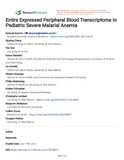Entire Expressed Peripheral Blood Transcriptome in Pediatric Severe Malarial Anemia

Date
2023-06-19Author
Anyona, Samuel
Cheng, Qiuying
Guo, Yan
Raballah, Evans
Hurwitz, Ivy
Onyango, Clinton
Seidenberg, Philip
Schneider, Kristan
Lambert, Christophe
McMahon, Benjamin
Ouma, Collins
Perkins, Douglas
Metadata
Show full item recordAbstract
This study on severe malarial anemia (SMA: Hb < 6.0 g/dL), a leading global cause of childhood morbidity and mortality, analyzed the entire expressed transcriptome in whole blood from children with non-SMA (Hb ≥ 6.0 g/dL, n = 41) and SMA (n = 25). Analyses revealed 3,420 up-regulated and 3,442 down-regulated transcripts, signifying impairments in host inflammasome activation, cell death, innate immune responses, and cellular stress responses in SMA. Immune cell profiling showed a decreased antigenic and immune priming response in children with SMA, favoring polarization toward cellular proliferation and repair. Enrichment analysis further identified altered neutrophil and autophagy-related processes, consistent with neutrophil degranulation and altered ubiquitination and proteasome degradation. Pathway analyses highlighted SMA-related alterations in cellular homeostasis, signaling, response to environmental cues, and cellular and immune stress responses. Validation with a qRT-PCR array showed strong concordance with the sequencing data. These findings identify key molecular themes in SMA pathogenesis, providing potential targets for new malaria therapies.
URI
https://doi.org/10.21203/rs.3.rs-3150748/v1https://www.ncbi.nlm.nih.gov/pmc/articles/PMC10371159/
http://ir-library.mmust.ac.ke:8080/xmlui/handle/123456789/2415
Collections
- Gold Collection [1031]
